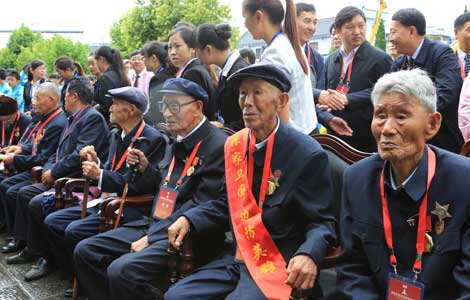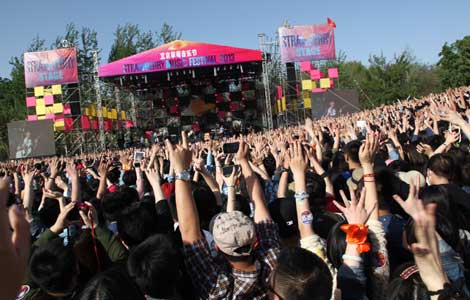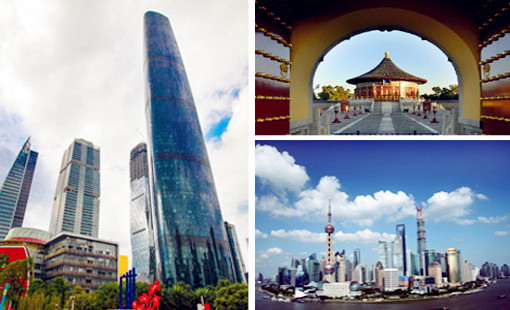China, Africa and global health
Updated: 2013-08-16 08:52
By Michel Sidibe (China Daily)
|
||||||||
The headline for this week's Ministerial Forum on China-Africa Health Development is clear: Solidarity on global health is essential and imperative. It is value for money. It saves lives. The commitment by Chinese leaders, and more than 30 ministers of health from African countries, representatives of businesses, civil society and academics, demonstrates that working together to ensure universal access to healthcare sets a new stage for South-South cooperation.
Economic growth in China and Africa, spurred by bilateral trade and cooperation, has improved the lives of people and lifted millions out of poverty. Investments in healthcare and education have increased all around, but inequalities remain both in Africa and China. So the unfinished agenda of the UN's Millennium Development Goals have to be completed in Africa as well as in China.
China and Africa are in a unique position to leverage their business and trade relationship to encourage breakthrough progress in healthcare. Trade between China and Africa is projected to reach $385 billion a year by 2015. To capitalize on this, China's State-owned enterprises should be encouraged to invest in and promote healthcare in Africa. Since seven of the world's 10 fastest growing economies are in Africa, Chinese investments in the healthcare sector in the continent can produce substantial financial gains as well as generate invaluable public goods.
Take for example the AIDS epidemic. Leadership has been pivotal in transforming the response to HIV/AIDS. China's response to HIV/AIDS, with firm support of its State leaders, has ensured that its spread does not spiral out of control, as many had feared.
Similarly, presidents and heads of states of African countries have acted decisively over the past decade to halt, and even reverse, the spread of HIV/AIDS by making treatment more easily accessible to people. Leaders both in China and Africa have used scientific and advanced methods to tackle the disease and have been committed to respecting the dignity of the people living with HIV/AIDS.
China, for example, has introduced the harm-reduction programs for people who inject drugs - effectively halting the spread of HIV among drug users. And African countries have made it easier for people to access antiretroviral medicines despite the challenges facing their healthcare systems. Today, more than 7.5 million people living with HIV/AIDS are on lifesaving antiretroviral medicines in Africa, and about 3.5 million lives have been saved. The majority of the active pharmaceutical ingredients (APIs) in these medicines are produced in China. As Africa builds its capacity to indigenously produce its essential medicines and diagnostic capabilities, access to quality APIs and raw materials from China could go a long way in ensuring viability and sustainability of manufacturing medicines in the continent.
China can establish a strategic partnership with the African Union and the New Partnership for Africa's Development to support the implementation of the Pharmaceutical Manufacturing Plan for Africa. By entering a new partnership with leading pharmaceutical companies and African leaders, China can promote the development of the African pharmaceutical industry based on entrepreneurship, competitiveness and production of affordable, quality medicines, including traditional medicines, in which China has unique expertise.
China's advanced research and development industry can help Africa develop the next generation of radically simplified tools and instruments for low-cost laboratory diagnostics and medical equipment. China has become a global leader in simple-value ultrasound systems, and it can work in partnership with Africa to develop low-cost, easy-to-use equipment and tests for communicable and non-communicable diseases. Breakthroughs in this area would not only help Africa meet its own growing needs for laboratory diagnostics and medical equipment, but also establish a China-Africa platform for medical research and development that could generate low-cost, easy-to-use health solutions for the world.
African countries' healthcare systems can learn effectively from China's experience of barefoot doctors as they increasingly embrace task-shifting as a key strategy to increase universal coverage of healthcare by training 1 million community health workers.
China has built thousands of hospitals, trained millions of medical personnel, improved healthcare systems and reduced mortality from AIDS and other diseases. As a result, the maternal and child mortality rates in China have fallen and life expectancy continues to rise. Such a scale-up and capacity building have to be replicated in Africa.
The Ministerial Forum on China-Africa Health Development this week has provided us with an excellent opportunity to discuss these issues and forge a path together. As an African proverb goes: "If you want to go fast, go alone. If you want to go far, go together." If we truly want to succeed together in the long run, going forward together is indeed the only choice.
The author is executive director of the Joint United Nations Programme on HIV/AIDS.
(China Daily USA 08/16/2013 page16)

 Thrills in store for Chicago Air and Water Show
Thrills in store for Chicago Air and Water Show
 Demolition work starts on rooftop villa structure
Demolition work starts on rooftop villa structure
 Memorial to expeditionary soldiers opens
Memorial to expeditionary soldiers opens
 Death toll from Egypt violence rises to 638
Death toll from Egypt violence rises to 638
 Tunes that travel
Tunes that travel
 Macabre Addams Family tests musical tastes
Macabre Addams Family tests musical tastes
 Spielberg has desire to work with Zhang Yimou
Spielberg has desire to work with Zhang Yimou
 Li Na advances to 3rd round at Cincinnati Open
Li Na advances to 3rd round at Cincinnati Open
Most Viewed
Editor's Picks

|

|

|

|

|

|
Today's Top News
Exporters take heart from signs of US rebound
Clinton: US behind China in Africa
Chinese reduce Treasury holdings
Canadian deal boosts Chinese aircraft ambitions
The 'bad boys from Boston' are set to rock Shanghai
Global universities ranked by survey
No remorse as Abe marks surrender anniversary
China to be world's No 1 consumer
US Weekly

|

|







